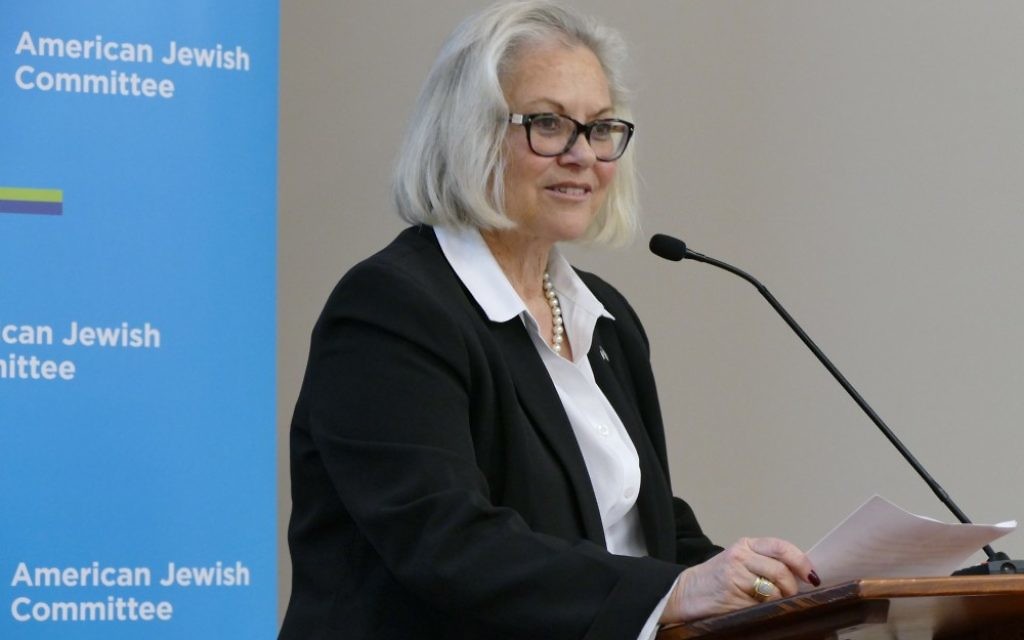Safed Hospital Saves Hundreds of Syrians
“For the last three years, an Israeli hospital near the Syrian border has quietly become a sanctuary for wounded Syrians,” Israeli Consul General Judith Varnai Shorer said at Young Israel of Toco Hills on Thursday night, March 31.
Ziv Medical Center in Safed, just west of the Golan Heights in the eastern Galilee, is run by Dr. Salman Zarka, the first Druze to lead an Israeli hospital. Zarka, who served as a colonel in the Israel Defense Forces and most recently commanded military health services before his IDF retirement in 2014, was the guest speaker at the program, sponsored by Young Israel, American Jewish Committee’s ACCESS young professional group and the consulate.
Ziv has treated some 800 of the more than 2,600 Syrians who have received medical care in Israel the past three years, Zarka said, including a 15-year-old girl who gave birth to twins in February.
Get The AJT Newsletter by email and never miss our top stories Free Sign Up
More than 70 percent of the Syrian medical community has fled the country since the war began in 2011, Zarka estimated, and most of its care facilities are damaged or destroyed. “The internal conflict that started at the center of Syria had extended by 2013 to the area right next to our borders,” he said. “After an evaluation of the new situation, a decision had to be made: to close the border or provide medical support.”
The precedents are troublesome, Zarka said. “Thinking about Syria, we have in our minds the painful wars that were conducted between our two countries, especially Yom Kippur, with thousands of casualties. If it’s your sworn enemy, it is legitimate to close the border.” He said that even now, most Syrians hate Israel and want to erase it from the map.
“But in our tradition, we are ordered to try to save lives,” he said. “For religious reasons, yes, we need to provide medical support.”
Zarka also referred to the “historical imperative of the Holocaust” and his own medical code of conduct as reasons for assisting the wounded of an enemy nation. “I am a physician, and I am sworn to save lives.”
According to the Syrian Center for Policy Research, the war has directly and indirectly killed 470,000 people and caused casualties among 11.5 percent of the population. Zarka put the number of wounded at almost 2 million. The United Nations ceased collecting statistics on the war 19 months ago because of its precarious sources within Syria.
Ziv’s inclusive policy has faced criticism. “There is a debate about treating Syrians at Ziv. It is not a rich or a big hospital,” Zarka said. “I’ve been told, ‘You need first of all to treat your citizens, not the Syrian people, and if there are only seven operating theaters, and you need to operate on Syrians, it seems that sometimes you will postpone an Israeli citizen.’ They do not like it. I can understand that. Secondly, who will pay for that? Treating an Israeli is less expensive than treating a Syrian. The government pays us the same amount for each, so it’s not enough.”
Zarka said patients, often with complicated injuries, are treated solely in accordance with their medical needs, regardless of whether they are civilians or combatants. “Their names and identities are not so important for us. We just want to treat them. We do not ask about religion or which party they belong to.”
There is only one standard of care, not two, Zarka said. “Israelis and Syrians are treated the same at our hospital.”
As an example, he showed photos of a little girl’s shattered lower leg and said that the quick, easy, cheap treatment would have been amputation. Instead, Ziv conducted more than half a dozen surgeries, committed to months of hospital care and fitted the girl with an expensive medical device to save the leg.
“Some are afraid that the fact they were treated in Israel will become known,” Zarka said, so the staff takes precautions such as writing patients’ release letters in English and Arabic instead of Hebrew before sending them back to Syria. “We cannot predict their future. We are doing our best to provide them with solutions that will help them survive — drugs, treatments and equipment — and to make their lives better.”






comments